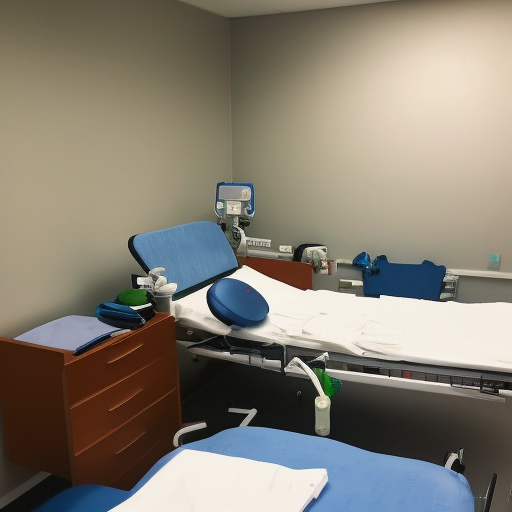|
A Hospital discharge can be an overwhelming experience. Fortunately, there are several steps you can take to ensure a successful transition back into everyday life. From getting enough rest and eating healthy to asking for help from family and friends, these post-discharge tips will help you get back on track toward full health. Additionally, researching local resources such as support groups or home health agencies could provide additional assistance during this time of recovery. Read on to learn more about how you can make sure that your hospital stay ends with a smooth transition!
1. Follow your doctor’s instructions for post-discharge care Making sure you follow the instructions that your doctor gives you after getting discharged is essential for a successful recovery. Post-discharge care includes taking medications, exercising regularly and eating healthy, following any dietary recommendations, attending physical therapy sessions if needed, and seeking medical attention if there is any cause for concern. Following these instructions will help to ensure that you are receiving the best possible care and allow you to safely transition back into everyday life. All of these suggestions will also help to reduce the risk of a future hospital stay or complications from an existing condition. 2. Make sure to get enough rest and follow a healthy diet Getting enough rest and eating a healthy diet are key components of post-discharge care. Not only should you be getting adequate rest, but also ensure that your sleep is of good quality. Eating nutritious meals composed of fresh fruits, vegetables, and lean proteins can help your body to heal properly while providing all the necessary vitamins and minerals. Try to avoid processed and sugary foods as much as possible. Additionally, make sure you are drinking plenty of water throughout the day. This will help your body stay hydrated and aid in recovery. 3. Ask for help from family and friends if you need it Asking for help from family and friends is an important part of post-discharge care. It can be difficult to recover alone, especially if you are also trying to take care of other responsibilities like work. Having a supportive network can make all the difference in your recovery process. Ask your loved ones to help out with tasks such as grocery shopping, cooking meals, doing laundry, or running errands. They might even just provide emotional support when you don’t feel like doing anything else. Don’t be afraid to reach out for assistance during this difficult time – it could make all the difference for a successful transition back into everyday life! 4. Contact your primary care provider to schedule any follow-up appointments or tests that may be necessary Following discharge from the hospital, it is essential to contact your primary care provider and schedule any follow-up appointments or tests that may be necessary. Doing so will ensure that you are taking all the appropriate steps for a successful recovery, as well as reducing the risk of future hospital stays or complications. Follow-up appointments could include checkups with your doctor, any physical therapy needed, lab work or scans required for monitoring changes in health status, and other treatments needed. Additionally, make sure to ask questions of healthcare providers during these visits and discuss any concerns or symptoms you may be experiencing. Scheduling regular follow-ups with your primary care provider can help you get back on track toward a healthy life! 5. Research local resources such as support groups, counseling services, or home health agencies that can provide additional assistance during recovery Researching local resources such as support groups, counseling services, or home health agencies that can provide additional assistance during this time. Support groups offer patients and their families a chance to connect with others who are going through similar experiences. Counseling services can help individuals better cope with emotions related to their diagnosis or treatment plan. Home health agencies provide medical personnel such as nurses, physical therapists, nutritionists, and other specialists right in your own home which can be beneficial for those unable to leave the house due to illness or disability. Taking advantage of these available resources will give you more tools to help on your journey back to full health after discharge from the hospital! Post-discharge care is essential for a successful recovery and for avoiding future hospital stays or complications. Taking the necessary steps to ensure that you are getting enough rest, following a healthy diet, asking your loved ones for help if needed, scheduling follow-up appointments with your primary care provider, and utilizing local resources can all make an impact on how quickly you transition back into everyday life. With proper post-discharge care and support from family and friends, it’s possible to achieve full health after leaving the hospital! Comments are closed.
|
AuthorTyice Strahl Categories
All
Archives
May 2023
|
- Home
-
Settings
- Assisted Living
- Home Care
- Independent Living
- Memory Care
- Skilled Nursing
- Adult Family Homes
-
All Communities
>
- Aspen Quality Care
- Avamere South Hill
- Brighton Court
- Brookdale Nine Mile
- Brookdale Park Place
- Cheney Assisted Living
- Cherrywood Assisted Living
- Colonial Court
- Cornerstone Court
- Evergreen Fountains
- Palouse Country
- Fairview Assisted Living
- Fairwinds
- Fairwood
- Fieldstone Memory Care
- Good Samaritan
- Maplewood Gardens
- Moran Vista
- North Point Village
- Orchard Crest
- Pine Ridge Memory Care
- Emilie Court
- Ridgeview Place
- Riverview Retirement
- Rockwood Retirement Community
- Rose Pointe Assisted Living
- Royal Park
- South Hill Village
- Sullivan Park Assisted Living
- Sunshine Health Facilities
- Touchmark Assisted Living
- Willow Grove
- Wind River
- Alderwood Manor
- Franklin Hills
- Manor Care
- North Central Care Center
- Providence St Joseph
- Regency at Northpointe
- Royal Park Health and Rehabilitation
- Spokane Veterans Home
- The Gardens on University
- Spokane Assisted Living Directory
- Locations
- Services
- About
- Senior Living Blog
- Contact


 RSS Feed
RSS Feed
